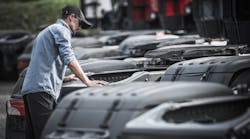Claiming it hinders industry decarbonization, transportation and trucking stakeholders are renewing calls on Congress to repeal the Federal Excise Tax on heavy-duty commercial vehicles. While the FET repeal movement has found support on both sides of the aisle in recent years, the century-old law continues to make trucking more expensive.
“If Congress is serious about safety, the environment, and jobs, then repealing the FET should be front-burner," Chris Spear, American Trucking Associations’ president and CEO, said on Feb. 22. "It’s time to shelve this World War I era tax and start putting the best equipment on our roads.”
See also: New, pending, and possible rules and regulations facing fleets in 2023
Calling it outdated, ATA joined the American Truck Dealers and Zero Emission Transportation Association trade organizations in penning a letter to Congressional leaders urging them to end the more than century-old truck tax.
“The FET for heavy-duty trucks, which was enacted in 1917 to help defray the costs of World War I, is an antiquated tax and barrier to investment in the cleanest and safest trucks and equipment available on the market,” reads the letter signed by Spear, ATD’s Laura Perrotta, and ZETA’s Albert Gore.
The previous Congress saw bipartisan support for FET repeal in both the House and Senate. In 2021, Senators Todd Young (R-Indiana) and Ben Cardin (D-Maryland) and Representatives Doug LaMalfa (R-California) and Chris Pappas (D-New Hampshire) introduced the Modern, Clean, and Safe Trucks Act, which would have repealed FET. But like previous bills introduced over the past decade, it never made it beyond committee.
In October, Rep. Peter DeFazio (D-Oregon) told fleet executives at ATA’s Management Conference & Exhibition that the FET should be “done away with altogether.” But DeFazio, who did not seek re-election last year, said that Congress would likely have to find a way to replace FET revenue before repealing the tax.
"The federal excise tax harms American truckers and fleet operators by inflating the cost of heavy-duty trucks and limiting access to the many economic and public health benefits that come with transportation electrification," according to Gore, executive director at ZETA. "Medium- and heavy-duty trucks account for 24% of all transportation carbon emissions in the U.S. but represent only 4% of vehicles on the road. It is time to accelerate our movement towards modernized transportation fleets, and we must enable our nation's fleet operators and truckers to join in this effort."
105 years of making trucks cost even more
The initial 3% tax on trucks introduced during World War I—long before the modern trucking industry—has ballooned to 12%. The FET applies to heavy-duty tractors, trucks, and trailers, based on weight. ATA said the tax could add $50,000 to low- and zero-emission equipment prices, impeding alternative fuel investments by smaller fleets. The tax applies to the first sale of heavy-duty trucks, straight trucks with trailers, or semitrailer chassis and body, which ATA contends drives up the consumer costs for goods those trucks and tractors haul.
See also: AEB requirement for heavy trucks up next on federal regulations docket
“Excise taxes increase the taxed commodity's price, resulting in reduced interest from potential customers,” the trio wrote to Republican and Democrat leaders in Congress. “Additionally, over 90% of the nation’s trucking fleets operate six or fewer trucks, and the regressive nature of the FET makes it disproportionately hard for these small businesses, many of which are family-owned and operated, to purchase new equipment. Larger fleet operators take longer to modernize their vehicles due to price increases from the onerous excise tax.”
Earlier this month, Senate Republicans backed a resolution to repeal the Environmental Protection Agency’s more stringent emissions rules for heavy-duty truck and engine manufacturers. That new EPA rule applies to model year 2027 equipment and engines and is part of the EPA’s three-step Clean Truck Plan. It pushes traditional internal combustion engines to cut NOx emissions and incentivizes fleets to convert to zero-emission equipment.
“The federal government wants heavy-duty trucks to be cleaner or emission-free but slaps a 12% tax on the newest, greenest trucks,” said Scott McCandless, ATD chairman and president of McCandless Truck Center in Aurora, Colorado. “If the goal is to reduce emissions, repealing the counterproductive FET is a good place to start.”




